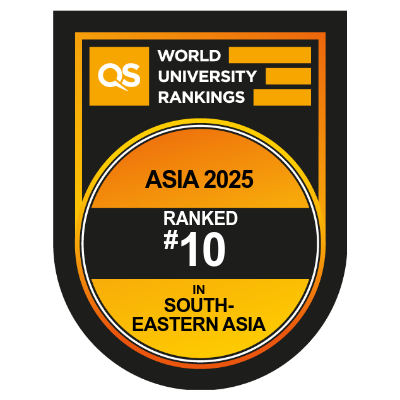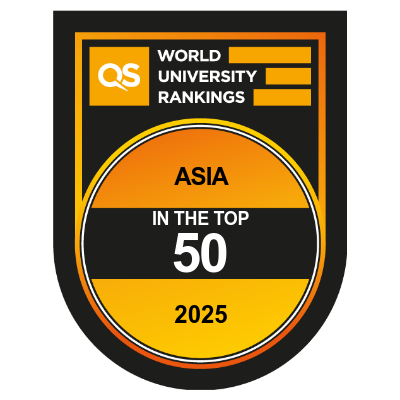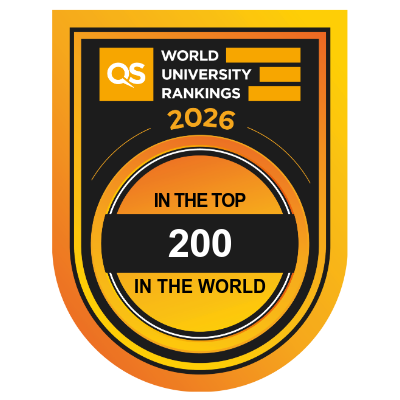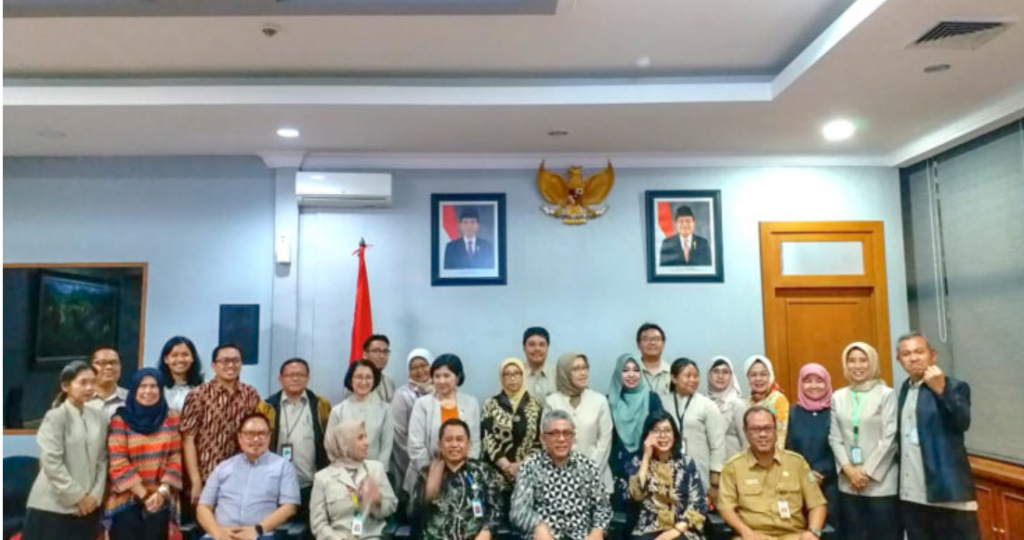SDG 16 and 17 explore some of the underlying factors that are needed in order to ensure delivery of the other SDGs. Peace and Justice go hand in hand – and indeed are vital for equity between people and countries. Supporting this we need our institutions to be strong enough to maintain a focus on delivering the SDGs. This can range from individual justice – eradicating modern slavery and people trafficking – to ensuring that our countries have the evidence base needed to react appropriately to crises.
THE Impact Rankings Methodology 2022, p. 177
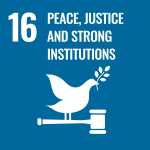
University governance measures
Universitas Indonesia has selected representatives of the university’s highest governance: students, faculty, and staff. For example, Universitas Indonesia’s Board of Trustees as the university’s body with normative function in the non-academic fields representing the Government, Community, and UI to determine general policies as well as supervise and evaluate the management system including financial health. The Board of Trustees consist of 17 members. In addition, there is a Faculty Academic Senate, such as in the Faculty of Dentistry.
Universitas Indonesia acknowledges student unions at the university and faculty level. The student unions provide a forum for students to actualize their intellectual abilities, speak their aspirations, and develop their talents and hobbies through activities with positive impact on the campus and in the public. One of the examples is the Student Executive Board, Student Association, and other organizations in each faculty.
Universitas Indonesia has policies and procedures to identify local stakeholders external to the university and engage with them through the Rector’s Decree number 03 in 2020 Amendment to Rector’s Decree No.025 of 2019 concerning the Special Work Unit for Community Service.
UI also has a unit to handle discipline, security, convenience, and K3L on campus, namely the Sub-Directorate of the Campus Environment Development (Subdit PLK) that is part of the Sub-Directorate of the General Directorate and Facilities of UI. The university is committed to handling security, order and convenience issues as well as K3L on campus. It becomes a challenge to the Subdit PLK to perform duties and functions to protect, secure, and monitor the campus environment from threats, challenges, obstacles, and intrusion from inside and outside the campus.
Therefore, Subdit PLK UI disseminates its policies, regulations, procedures, and programs to the employees. One of which is compiling Technical Guidelines for Occupational and Environmental Order, Security, Comfort, Safety, and Health. This book is applicable for the society of academicians of UI and communities around campus, also accessible through the website plk.ui.ac.id and k3l.ui.ac.id.
Technical Guidelines for Occupational and Environmental Order, Security, Comfort, Safety, and Health
Universitas Indonesia has a participatory role, such as the Special Work Unit for Community Service (UKKPM). The UKKPPM management in campus environment is regulated in Rector’s Decree No.003 in 2020 Amendment to Rector’s Decree No.025 in 2019 concerning the Special Unit Work for Community Service. Community Service (Engagement with Local Stakeholders) is an integral part of the public services provided by the university (University Services). The Student Executive Board, both at the university or faculty level, can be a participatory role in involving various stakeholders and local communities. The engagement of stakeholders is manifested in the structure of the Board of Trustees University of Indonesia such as Lecturer Representatives, Community Representatives and Student Representatives.
Universitas Indonesia is appointed by the Directorate General of Higher Education (DGES) of the Ministry of Education and Culture as one of the institutions for the State University Integrity Zone Development as a government effort to implement better and cleaner university management towards Corruption-Free Zone (WBK) and Clean Bureaucracy Zone (WBBM). Following the mandate, in order to perform Bureaucratic Reform within the campus area, in 2020, UI launched the Faculty of Public Health (FKM UI) as a pilot work unit proposed as an Integrity Zone.
The Inauguration of PTN Integrity Zone Team of the Faculty of Public Health
The applied principles of University regarding corruption and bribery are to socialize the Nine Fundamental Values to the entire UI community as proof that the university is committed to fight against organized crime, corruption & bribery, and plagiarism.
Furthermore, Universitas Indonesia has a Whistle Blowing System (WBS UI) as a reporting mechanism for actions suspected of violating the University’s Code of Ethics and Conduct and/or internal regulation and/or laws and regulations by the society of academicians of Universitas Indonesia.
Universitas Indonesia supports academic freedom as stated in PP 68 of 2013 concerning Statute UI. It is stated in article 8 that: (1) The academicians of UI have freedom and scientific autonomy to conduct activities related to education and responsible development of science, technology and/or art. (2) The code of ethics for academic freedom and scientific autonomy is part of the academic code of ethics set by Rector with the DGB approval.
In addition, Article 16 (1) states that UI is obliged to support, facilitate, and encourage research projects as a form of academic freedom, freedom of thoughts, and responsibility.
Article 41 states that (1) DGB has the following duties and obligations: letter d. to ensure the implementation of regulations for academic freedom, academic pulpit freedom, and scientific autonomy.
In addition, there is a Rector’s Decree number 279/SK/R/UI/2018 concerning the Determination of Key Behavioral Indicators of Cultural Values at Universitas Indonesia which includes academic freedom in Universitas Indonesia.
Universitas Indonesia publishes financial information that is accessible for public through the following link.
Financial Report of Universitas Indonesia – December 31, 2020 (Audited)
Working with government
Universitas Indonesia provides special expert advices to local, regional, or national governments. At the local level, UI compiles a policy brief related to the tax policies for the community prone to the Covid-19 pandemic.
Policy Brief related to Public Tax for the community prone to Covid-19
At the regional level, UI develops agroforestry-based tourism in North Sumatra. Lake Toba is an internationally recognized super-priority tourist destination. Despite having superior resources, its tourism development faces many challenges, including the increasing number of critical lands; people gaining insufficient benefits from tourism activities; and the difficulty to obtain community support and participation in creative economy and tourism activities.
At the national level, in this battle against the COVID-19 pandemic in Indonesia, Epidemiology experts from the Faculty of Public Health, Universitas Indonesia play an important role. As the Coordinating Minister for Maritime Affairs of the Republic of Indonesia, Luhut Binsar Panjaitan, has said in a recent interview with one of the well known online media in Indonesia, Epidemiology experts including Mr. Pandu Riono and Mr. Iwan Ariawan from the Faculty of Public Health, Universitas Indonesia have contributed greatly in overcoming the spike in COVID-19 cases in Indonesia quickly and precisely. Moreover, UI arranges various policy briefs, including collaboration with the Ministry of Transportation in developing a strategy for recovering the aviation business post Covid-19 pandemic and optimizing the aviation sector performance within and post Covid-19 pandemic. In addition, UI is also involved in the preparation of Guidelines for the Quick Medical Handling of Covid-19 and Public Health in Indonesia in collaboration with the Ministry of Health of the Republic of Indonesia. The Professor of the Faculty of Law of Universitas Indonesia become the Special Staff to the Vice President of Indonesia for the Law Department. It signifies direct involvement in providing direct advice on a national level. It is similarly experienced by two IKGM-P lecturers from the Faculty of Dentistry, Universitas Indonesia who are listed in the Dental and Oral Health Committee of the Ministry of Health of the Republic of Indonesia.
In addition, there is also the UI Mahadata Synergy Team of COVID-19 Response as researchers working on the Covid-19 pandemic issues.
PUSKAPA works to help the government provide legal identity documents for all children and adults, regardless of their gender, socioeconomic status, and ability. These legal identity documents should facilitate their access to health, education, social services, protection, and economic opportunities. At the same time, PUSKAPA works to ensure that civil registration produces complete and accurate population-based vital data (especially birth, death, causes of death, marriage, divorce, migration, and adoption), and that these statistics inform child wellbeing programs and policies.
The ongoing programs of PUSKAPA: (1) Inclusive and Accountable Civil Registration and Vital Statistics (CRVS), supported by National Development Planning Agency (Bappenas) and the Australian Government through KOMPAK; (2) Birth Registration and CRVS for all, supported by Bappenas and UNICEF; (3) Assisting the implementation of Presidential Regulation 62/2019 on National Strategy for CRVS, supported by the Ministry of Home Affairs, Bappenas, and the National Secretariat AKPSH
Policy brief to ensure access for vulnerable groups to Covid-19 vaccination in Indonesia
Bridging Inclusion: Understanding Vulnerability in Indonesia’s CRVS System
2019 Pilot Report: Longitudinal Study of Children and Families
The commitment of Universitas Indonesia in terms of outreach and education of policymakers and lawmakers is manifested through various activities. For example, the collaboration agreement with the Commitment Making Officials (PPK) of the Ministry of National Development Planning/National Development Planning Agency (Bappenas) in employing 11 Civil Servants for Master Program in Economic Planning and Development Policy, Faculty of Economic and Business. In addition, the training can also take the form of a seminar in which the Faculty team will be the speaker, such as a Professor of the Faculty of Public Health of UI becomes a speaker in a national webinar on human resources quality improvement and sustainable health development with Commission IX of DPR RI, Commission XI of DPR RI, Budget Department of DPR RI, Fatayat NU, Indonesian Tobacco Control Network and The Union Indonesia.
Universitas Indonesia collaborates with various institutions to provide full access to research activities in order to achieve sustainable development goals. The following is information on academic and non-academic collaborations in 2020 from Ventures, Collaborations, and Alumni of the Faculty of Economic and Business.
Academic and non-academic partnerships of the Faculty of Economics and Business 2020
During the pandemic, UI provides a neutral platform and a ‘safe’ space for different political stakeholders to gather and discuss the challenges. For example, in the YouTube UI channel.
In addition, the university has alumni association named ILUNI UI holding the following programs: 1) DISCUSSION ON THE LATEST ISSUES (OPINI): a podcast program to discuss the latest issues in an actual, objective, and neutral manner that invites experts and practitioners; and 2) SALEMBA DISCUSSION FORUM (FDS): a monthly discussion forum.
SDG 16 IN NUMBERS
Number of graduates in most recent year
–
Number of graduates from Law
–
Percentage of graduates from Law
–
RELATED NEWS
Select an image for which you want to see the achievement of the SDG indicators

